#padraic colum
Explore tagged Tumblr posts
Text

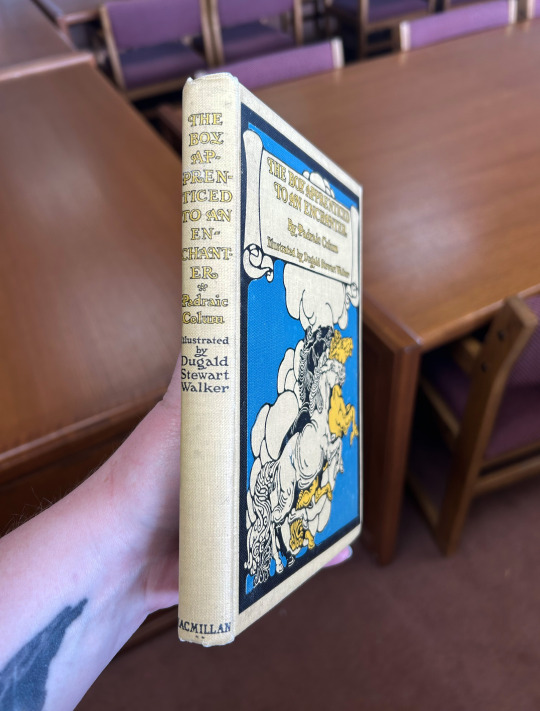
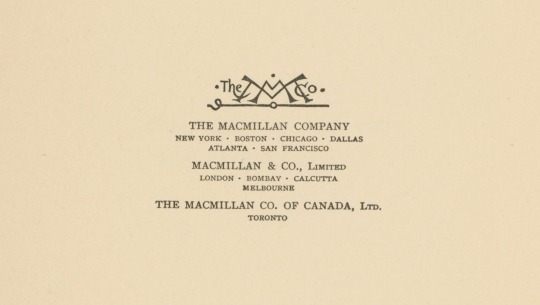
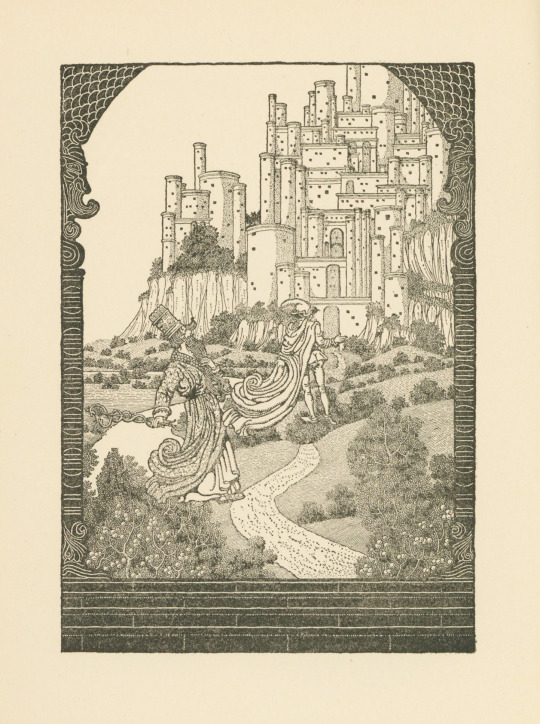
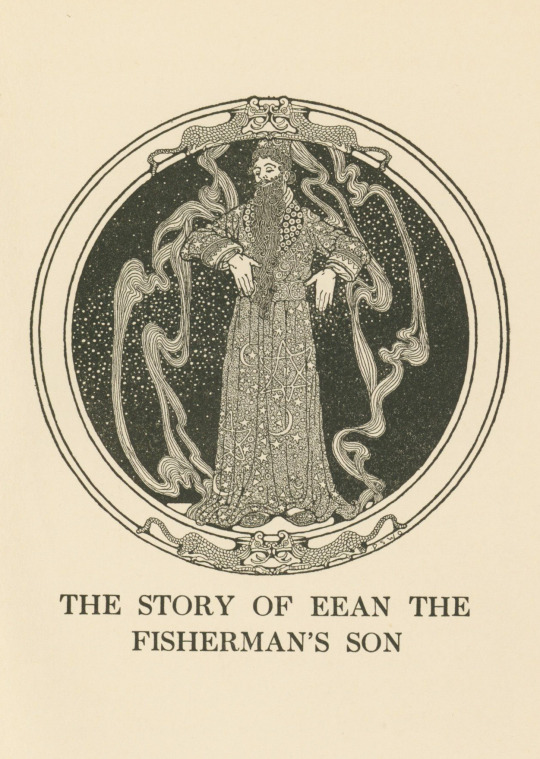
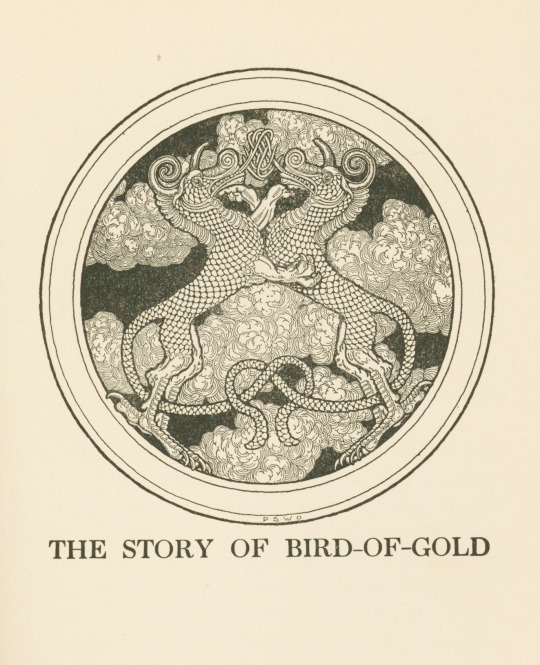

Publishers' Binding Thursday
I found this week's Publishers' Binding Thursday selection while simply browsing the stacks. I noticed the spine first, and when I pulled the book out saw the three, bright, galloping horses on the cover. The book is The Boy Apprenticed to an Enchanter by Irish poet, author and folklore collector Padraic Colum (1881-1972). It was published by the Macmillan Company in 1920 with illustrations by American illustrator Dugald Stewart Walker (1883-1937). This book is part of our Historical Curriculum Collection of children's books.
The cover is a cream bookcloth with blue, yellow, and black color stamping. A white horse, a yellow horse, and a black horse rear up as a cloud of dust rises behind them on a blue background. The title is in a cream banner at the top and is stamped in yellow with a black outline. The title, author's name, and illustrator's name are stamped on the spine, with the publisher stamped at the bottom.
View more Publishers' Binding Thursday posts.
-- Alice, Special Collections Department Manager
#Publishers' Binding Thursday#The Boy Apprenticed to an Enchanter#Padraic Colum#Macmillan Company#Dugald Stewart Walker#color stamping#publishers' bindings#horses#illustrations#children's books#Historical Curriculum Collection
65 notes
·
View notes
Text

Odysseus Victorious Over the Suitors of His Wife, illustration by Willy Pogany for Padraic Colum’s The Adventures of Odysseus and the Tale of Troy (1918)
64 notes
·
View notes
Text

"When the King of the Cats Came to King Connal's Dominion" is available to read here
#short stories#short story#when the king of the cats came to king connal's dominion#padraic colum#irish lit#english language lit#20th century lit#have you read this short fiction?#book polls#completed polls#links to text
9 notes
·
View notes
Text
#OTD in 1913 – Also known as “The Great Dublin Lockout”, the Dublin Transport Strike, led by Jim Larkin and James Connolly, begins.
The Great Dublin Lockout starts and one of the most bitter and divisive labour disputes in Irish history will run until February 1914 when starving workers are forced back to work. Five years previously, in 1908, at a time when Irish labourers were working in atrocious conditions, Union organiser Big Jim Larkin founded the Irish Transport and General Workers Union (ITGWU). The 1913 Lockout…

View On WordPress
#AE Russell#Dublin#Dublin United Tramway Company#George Bernard Shaw#History of Ireland#Irish History#Irish Independent#Irish Transport and General Workers Union#ITGWU#James Connolly#Jim Larkin#Padraic Colum#Padraig Pearse#The Dublin Transport Strike#The Great Dublin Lockout#William Butler Yeats#William Murphy
8 notes
·
View notes
Text
Credit to @thechestnuthead for tracking down the following info on this.:
It's an illustration by Willy Pogany of The golden fleece and the heroes who lived before Achilles by Padraic Colum
https://archive.org/details/goldenfleeceandh00colurich/mode/1up

22K notes
·
View notes
Text

An Old Woman of the Roads, Padraic Colum
0 notes
Audio
The Old Woman of the Roads -- Padraic Colum
O, to have a little house! To own the hearth and stool and all! The heaped-up sods upon the fire, The pile of turf against the wall!
To have a clock with weights and chains And pendulum swinging up and down! A dresser filled with shining delph, Speckled and white and blue and brown!
I could be busy all the day Clearing and sweeping hearth and floor And fixing on their shelf again My white and blue and speckled store!
I could be quiet there at night, Beside the fire and by myself, Sure of a bed; and loth to leave The ticking clock and the shining delph!
Oh! but I'm weary of mist and dark, And roads where there's never a house or bush, And tired I am of the bog, and the road, And the crying wind and the lonesome hush!
And I am praying to God on high, And I am praying Him night and day, For a little house--a house of my own-- Out of the wind's and the rain's way.
0 notes
Text
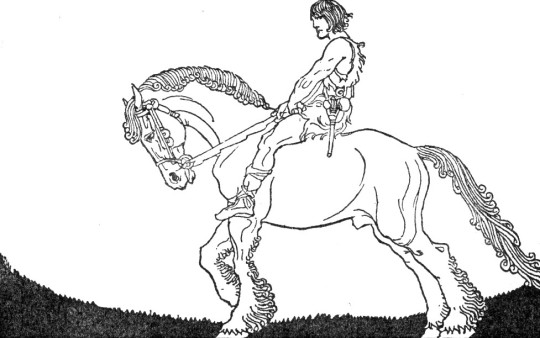
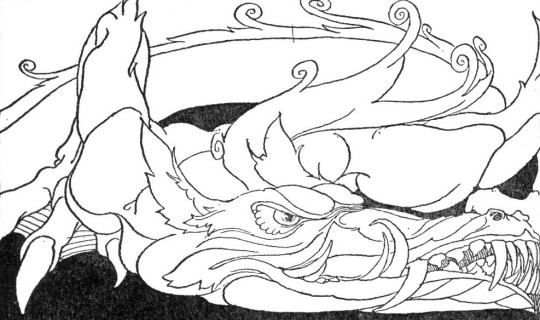
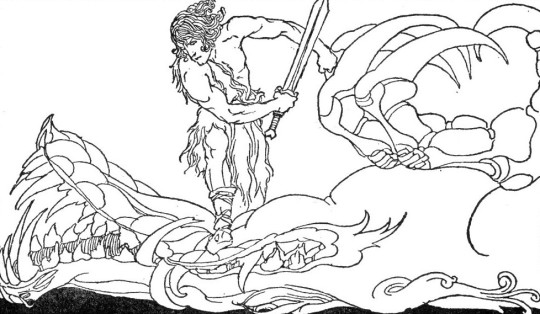
Illustrations from Padraic Colum's The Children of Odin by Willy Pogany (1920)
#willy pogany#art#illustration#golden age of illustration#1920s#1920s art#vintage art#vintage illustration#vintage#hungarian art#hungarian artist#books#book illustration#mythology#norse mythology#sigurd#fafnir#dragon#dragons#classic art
424 notes
·
View notes
Text
REBLOG: FROM THE EVIL CLERGYMAN : THE CHILDREN OF ODIN (1216)

source the-evil-clergyman origin Dec 29, 2021
The three illustrations posted by evil clergyman are taken from the book based on three stories from the book. I have put voice to the stories. You can also listen while you read.

Listen or listen while reading along.
1216-1link https://ok.ru/video/8218302876211 Text: Editing THE CHILDREN OF ODIN The Book of Northern Myths – Medium source: The Project Gutenberg eBook of The Children Of Odin, by Padraic Colum.
Valkyrie

Listen or listen while reading along.
1216-2link https://ok.ru/video/8218317883955 Text: Editing THE CHILDREN OF ODIN The Book of Northern Myths – Medium source: The Project Gutenberg eBook of The Children Of Odin, by Padraic Colum.

Illustrations from Padraic Colum’s The Children of Odin by Willy Pogany (1920) reblog source the-evil-clergyman origin Dec 29, 2021
Listen or listen while reading along.
1216-3link https://ok.ru/video/8218325289523 Text: Editing THE CHILDREN OF ODIN The Book of Northern Myths – Medium source: The Project Gutenberg eBook of The Children Of Odin, by Padraic Colum.
AUDIOBOOK
youtube
1216-4link https://youtu.be/qxLmT-Q4o08
youtube
link https://youtu.be/AaGUbLynISk
REBLOG: FROM THE EVIL CLERGYMAN : THE CHILDREN OF ODIN (1216)
7 notes
·
View notes
Photo

The Six Who Were Left in a Shoe - Padraic Colum, Dugald Stewart Walker, ill. - 1923 - via Internet Archive
397 notes
·
View notes
Text
I noticed something that i thought was really fun and interesting while playing Reckoning of New York a while back, and realized I had not shared it here yet
The spelling of Pádraic's name is obviously Irish, and when I read it I was immediately reminded of the writer Padraic Colum and thought it was just a neat coincidence
It was once we get to see Pádraic's haven and it specifically mentions him having novels by James Joyce that I started to think it wasn't such a coincidence, and it really cemented it for me once I got to play through his route and we hear his Voice and he alludes to a background in performing and theatre before he served in the military
Colum was an Irish writer and figure in the Irish literary and theatre revival movement who I became familiar with through working with some of his papers held at a library I used to work at
Colum befriended a number of other Irish writers of the time, such as Lady Gregory who was huge in the theatre scene and founded the Abbey Theatre of which Colum was a board member
Colum was also very close friends with James Joyce!!
James Joyce, famous writer of Finnegan's Wake which regularly alludes to Irish mythological figure Fionn mac Cumhaill
Fionn
FIONN
also this is a sketch of young Padraic Colum done by John B. Yeats


tell me we don't see it.
#padraic conroy#Pádraic Conroy#vampire the masquerade#vtm#reckoning of new york#i choose to believe that padraic was meant to be the child of someone involved in the irish literary revival#given when he died and his history it just makes sense#i don't care if people didn't like this game i loved it#and it felt like the writers actually loved the characters they were creating#julia was unbearable. shadows was like pulling teeth to get through i almost didn't continue the series
8 notes
·
View notes
Text










Wood Engraving Wednesday
BORIS ARTZYBASHEFF
Ukrainian American illustrator and wood engraver Boris Artzybasheff (1899-1965) produced twenty wood engravings to illustrate Orpheus: Myths of the World by Irish author and folklorist Padraic Colum (1881-1972), published in New York by the Macmillan Company in 1930. We show half of those engravings here which display Artzybasheff's distinctive bold forms and labyrinthine compositions. In this book, Colum brings together 58 related myths and legends from a wide range of world cultures, from the myths of Mesopotamia, Egypt, Greece, and Rome to those of India, Japan, Polynesia, and the Indigenous western hemisphere.
Our copy of this book is another donation from the estate of our late friend Dennis Bayuzick.
View more posts with illustrations by Boris Artzybasheff.
View other books from the estate of Dennis Bayuzick.
View more posts with wood engravings!
#Wood Engraving Wednesday#wood engravings#wood engravers#Boris Artzybasheff#Padraic Colum#Orpheus: Myths of the World#Macmillan#myths#legends#Dennis Bayuzick
155 notes
·
View notes
Text

Dugald Stewart Walker, illustration for 'The Girl Who Sat by the Ashes' by Padraic Colum, 1919
Via: https://www.instagram.com/p/DA3otjqIody/
2 notes
·
View notes
Text
#OTD in 1972 – Death of Longford poet and playwright, Padraic Colum. He was one of the leading figures of the Irish Literary Revival.
Padraic Colum was an Irish poet, novelist, dramatist, biographer and collector of folklore. He was one of the leading figures of the Celtic Revival. Colum wrote and met a number of the leading Irish writers of the time, including W. B. Yeats, Lady Gregory and Æ. He also joined the Gaelic League and was a member of the first board of the Abbey Theatre. He became a regular user of the National…
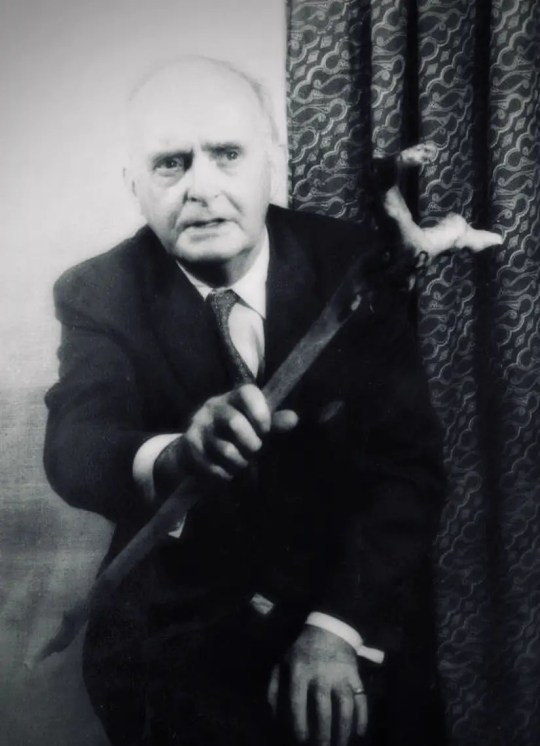
View On WordPress
4 notes
·
View notes
Photo

From The Boy Who Knew What the Birds Said by Padraic Colum, 1918.
2 notes
·
View notes
Text
On Shrove-Tuesday Cakes
I do not know what ingredients should go into a cake, or how these ingredients should be combined, or how the combination should be baked. But I know the temper in which cakes should be made. The temper should be that of affection and light-heartedness. Soups can be made by slaves. Meats may be cooked by mockers and salads mixed by suspicious, cross-eyed servitors. Fish and fowl can be prepared by fleshly men sunk in infamies. But cakes can only be made by the candid-eyed. Everyone knows that Cinderella could make cakes and that her jealous half-sisters couldn't, and it is clear to Shakespearian scholars that Cordelia would have been a cake-maker.
"I offer you cakes and friendship," said a remarkable lady to me once. She, being the most experienced lady in Dublin, knew that these went together. I cherish her friendship still and I have happy memories of her cakes. And I have happy memories, too, of the cakes of another lady who not only serves them but makes them—Mrs. Vaughn Moody. I have sat in her house with Rabindranath Tagore, both of us eating her cakes while we agreed that neither in the East nor the West were there cakes that more closely approached the ideal cake. Hers are cakes (or should we call them cates?) such as the Queen of Sheba gave Solomon when full of friendship for him.
“On Cakes: The Food of Friendship”, Padraic Colum (1931) for Commonweal Magazine
2 notes
·
View notes